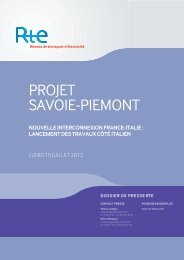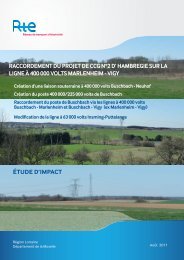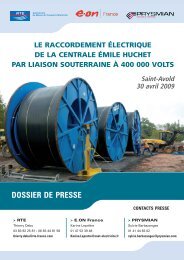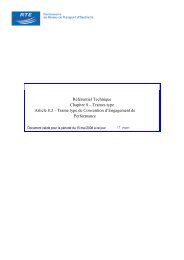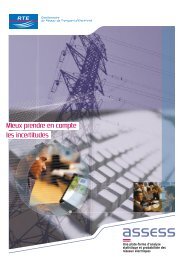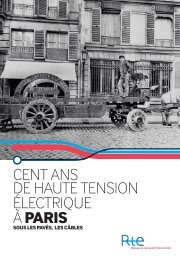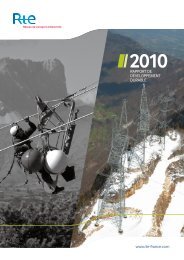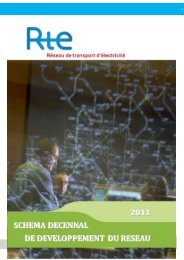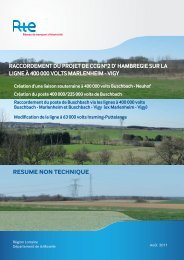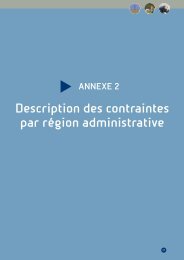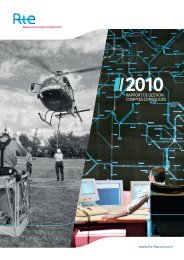Power System Reliability Report - RTE
Power System Reliability Report - RTE
Power System Reliability Report - RTE
- No tags were found...
Create successful ePaper yourself
Turn your PDF publications into a flip-book with our unique Google optimized e-Paper software.
R-AUDIT-SG-DAR-MAS-11-2011/022010 <strong>Reliability</strong> <strong>Report</strong>Page : 17/408 juillet 2011were revised in light of the major incidents that occurred in the years 2000, in particular, given thedifficulties encountered in terms of the overall diagnosis and restoration management of the incident 11of November 4 th 2006. The compliance review concerning the requirements of this policy needed to befinalized by <strong>RTE</strong> at the end of 2010.TSO compliance with this reference guide has been verified by a regular mechanism since 2006. In2010, it concerned policies 1 to 3, which involve the fundamental aspects of reliability that arefrequency control (primary, secondary and restoration of reserves) and safe operation (incidents tocover, data exchanges, controlling impacts on external networks, etc.). This mechanism is based on aself-assessment followed by a cross-analysis of the declarations. The results obtained show that theimplementation of the fairly complex operating measures adopted during the review of policy 3 afterthe incident of November 4 th 2006 can be improved 12 . This supports <strong>RTE</strong>‟s analysis that an adequatesolution is to assign a part of these activities to a structure such as CORESO.In addition, spot audits were carried out on the previous year‟s topic of self-evaluation. In 2010, 6randomly selected TSOs were audited by their peers in application of policy 8, concerning dispatchertraining.Although not perfect, the overall compliance verification process is useful and should serve in futureas a basis to develop adequate verification measures with regard to the application of Europeannetwork codes, once they have been promulgated by the EU.3.3 Contracting contributing to reliabilitySeveral points are worth noting with regard to Ancillary Services participation contracts.In September, the Court of Appeal confirmed the decision handed down by CoRDiS in 2009 dismissingthe POWEO case contesting its obligation to participate in ancillary services (cf 2009 report). By theend of the year, all of the producers who had previously refused to sign a participation contract didso.Specific technical conditions were agreed, after an in-depth consultation, to take into account thetechnical limitations of gas combined cycle plants, whose characteristics make it impossible for themto participate in primary frequency control (or „steep slope‟ secondary control) in conditions equivalentto other thermal units. The solution makes their effective participation in these controls possible,which is essential for the consolidation of future frequency control reliability, given the development ofthis generation technology. Tests must yet be carried out to actually confirm these control capabilities.Moreover, <strong>RTE</strong> led consultation work to define provisions for the next Ancillary Services contracts asthe current contracts are to be renewed in 2011. Subject to a finalisation in 2011 of the discussedchanges, two points concerning reliability are worth noting:It will be possible to sign a contract for voltage or frequency control services only, which willmake it possible to contract for the participation of certain specific units (wind power,photovoltaic) that can technically only provide a part of these services.In view of the problems arising from the lasting reduction in reactive power control capacities,the 2009 report underlined the inadequacy of the current contract penalties to ensure a returnto nominal capacities when the corrective actions require major work for the producer (e.g.:repairing an alternator). The new version of the contract discussed in 2010 defines a moreappropriate management of these situations between <strong>RTE</strong> and the concerned producer,including the setting up of an attractive absorption schedule for the producer, the interventionof third party expertise in case of disagreement and reinforced penalties in case of nonexecution.11 Following differences in forecasted and operational planning in Germany, cascade triggering of facilitiesoccurred, followed by the separation into several isolated sub-systems and frequency related load shedding(activated by a drop in frequency) to stabilise some of these sub-systems (including the French one)12 For example, for information and data exchanges allowing the monitoring of network reliability for each TSOin coordination with its neighbours, or the definition of "exceptional contingencies” to watch during the period arisk analysis justify it.Copyright <strong>RTE</strong>. This document is the property of <strong>RTE</strong>. Any communication, reproduction, publication even partial is forbidden without the express written authorisationElectricity Transmission <strong>System</strong> operator (<strong>RTE</strong>)



